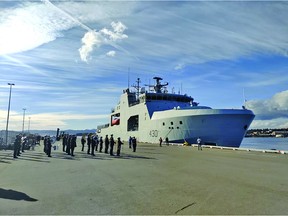The repairs to HMCS Harry DeWolf won’t be covered by Irving Shipbuilding because the warranty for the company’s workmanship on the vessel, delivered in 2020, was only for one year, a National Defence spokesperson said.

Canada’s new Arctic patrol ship HMCS Harry DeWolf will be out of service until April because of ongoing mechanical problems, but the military doesn’t yet have an idea how much repairs are going to cost taxpayers.
In addition, a second Arctic and Offshore Patrol Ship, HMCS Max Bernays, was accepted in September from Irving Shipbuilding even though a system that allows the vessel to manoeuvre wasn’t functioning properly, this newspaper confirmed.
Sign up to receive daily headline news from Ottawa Citizen, a division of Postmedia Network Inc.
Thanks for signing up!
A welcome email is on its way. If you don't see it, please check your junk folder.
The next issue of Ottawa Citizen Headline News will soon be in your inbox.
The repairs to HMCS Harry DeWolf won’t be covered by Irving Shipbuilding because the warranty for the company’s workmanship on the vessel, delivered in 2020, was only for one year, said Jessica Lamirande, a Department of National Defence spokesperson.
The problems are affecting the vessel’s four main diesel generators that provide electrical power and ship propulsion. HMCS Harry DeWolf left Halifax on Aug. 15 for an Arctic exercise, but already one of its main diesel generators was inoperable. Several days later, when the ship was off the east coast of Newfoundland and Labrador, another of the main diesel generators failed, forcing a return to Halifax.
National Defence is now conducting a technical investigation to try to figure out the problem, and repairs will be made at taxpayers’ expense.
“As the repairs are ongoing, we don’t yet have a full estimated cost,” Lamirande said. “It is expected that HMCS Harry DeWolf will return to operations in April 2023.”
The investigation will also look at whether the problem, which could be linked to an engine cooling system, might affect two other Arctic and Offshore Patrol Ships, HMCS Max Bernays and HMCS Margaret Brooke.
Lamirande also confirmed HMCS Max Bernays was docked on Nov. 23 to deal with problems with the vessel’s bow thruster. The bow thruster enables the ship to fine-tune its positioning during specific station-keeping manoeuvres, according to National Defence.
The problem with the bow thruster was known prior to the Royal Canadian Navy’s decision to accept delivery of the vessel from Irving in September.
Lamirande said the work on the ship should be complete by mid-December. Because that vessel is still under a one-year warranty, the repairs will be covered by Irving.
Irving declined to comment.
This newspaper was tipped off to the ongoing problems by Royal Canadian Navy sailors who have raised questions about the capabilities of the Arctic and Offshore Patrol Ships, also known as AOPS.
The navy had previously stated HMCS Harry DeWolf would return to service by early December.
But the failure of the main diesel generators is just the latest in a series of mechanical problems for HMCS Harry DeWolf. The vessel was to have joined in on the Arctic exercise, Operation Nanook, in early August, but was left in port because its fire suppression system wasn’t working properly. Sailors told this newspaper that system had been out of service for about a month.
With the fire suppression system repaired, HMCS Harry DeWolf left Halifax, but then the generator problems emerged. The Royal Canadian Navy stated that the failure was an “isolated incident”.
But in October 2020 the Canadian Press reported HMCS Harry DeWolf was forced to return to port after its freshwater generator and communications systems failed. It was while the ship was docked that the crew also found the cooling pumps on two of the ship’s four diesel generators had broken, the news service reported. HMCS Harry DeWolf was officially delivered by Irving to the navy on July 31, 2020.
The AOPS program has, over the years, faced delays and spending increases. Under the original timetable, the first AOPS was to have been delivered in 2013, with Arctic operations set for 2015.
But that first ship wasn’t delivered to Canada until July 2020.
In January 2015, the federal government announced it had awarded Irving Shipbuilding a $2.6-billion contract to build five AOPS. In 2018, that deal was expanded to add a sixth vessel. National Defence currently lists the project as costing taxpayers a little more than $4.3 billion.
In 2017, the Senate Defence Committee raised concerns about the vessels’ capabilities. “This (concern) is based on the fact that these ships cannot operate in ice more than a metre thick, are slower than a BC Ferry, can only operate in the Arctic from June to October and will require a Coast Guard escort when in the northern waters,” the senators pointed out in their report. “These limitations are troubling and raise the question of whether the taxpayers are receiving value for the monies spent.”
In the past, federal bureaucrats have been sensitive about news coverage of AOPS issues. In March 2019, officials with National Defence and Public Services and Procurement Canada warned Irving this newspaper was asking questions about problems with welds on the AOPS. Irving, in turn, threatened this newspaper with legal action.
National Defence, however, later confirmed there had been minor issues with welding on the AOPS and the article was published. No lawsuit was filed.
-

Rape survivor belittled about her mental health at DND sponsored symposium
-

Chronic pain research centre asks for resignation of retired general behind controversial speech


